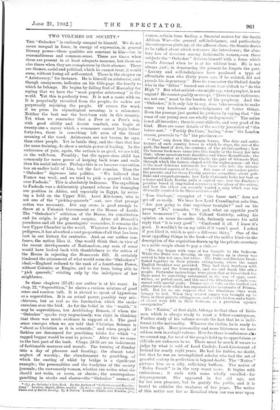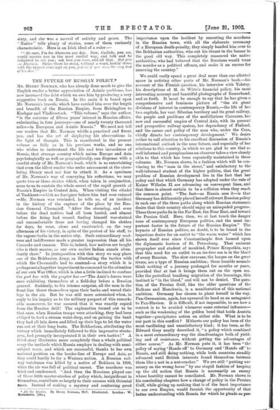TWO VOLUMES ON SOCIETY.* TRE " Onlooker " is curiously
unequal to himself. We do not mean unequal in force, in energy of expression, in general literary power—these qualities are constant in him—but in reasonableness and common-sense. There are times when these are present in at least adequate measure, but there are also times when they are conspicuous by their absence. There are thetnes, social and political, which he cannot treat, it would seem, without losing all self-control. There is the chapter on "Aristocracy," for instance. He is himself an aristocrat., and, though anonymous, indicates on his title-page the family to which he belongs. He begins by falling foul of Macaulay for saying that we have the "most popular aristocracy" in the world. Yet this is perfectly true. It is not a caste with us. It is perpetually recruited from the people ; its cadets are perpetually rejoining the people. Of course the word, if we press its etymological meaning, is a misnomer. Neither the best nor the best-born rule in this country. Yet when we remember that a Peer or a Peer's son, with good ability and decent conduct, can begin at twenty-one a career which a commoner cannot begin before forty-two, there is something left even of the literal meaning of the word. Aristocrats are not braver, he says, than other people. Yet in battle they, and the class that has the same training, do show a certain power of leading. In the endurance of pain, again, the artisan is as good, we are told, as the well-born. Possibly ; but the upper-class child has commonly far more power of keeping back tears and wails than his social inferior. Perhaps this is SO because convention has an earlier hold of him, but the fact remains. Then the " Onlooker " digresses into politics. "We believed that France was weak, and we tried to pick a quarrel with her over Fashoda." This is absolutely ludicrous. The expedition to Fashoda was a deliberately planned scheme for damaging our position in Africa, and especially in Egypt, by secur- ing a hold on the Upper Nile. Lord Kitchener, who is not one of the "picking-quarrels" sort, saw that prompt action was necessary. But any stone is good enough to throw at a Unionist Government or the House of Lords. The " Onlooker's " criticism of the House, its constitution and its origin, is petty and carping. After all Disraeli's paradoxes and all the genealogists' researches, it remains the best Upper Chamber in the world. Whatever the flaws in its pedigrees, it has absorbed a vast proportion of all that has been best in our history for centuries. And, as our author con- fesses, the nation likes it. One would think that, in view of the recent developments of Nationalism, any man of sense would have looked back with thankfulness to the action of the House in rejecting the Home-rule Bill. It certainly hindered the attainment of what would seem the "Onlooker's" ideal,—England reduced to the rank of a fourth-rate Power, without Colonies or Empire, and so far from being able to "pick quarrels," existing only by the indulgence of her neighbours.
In these chapters (17-21) our author is at his worst. In chap. 22, "Superstition," he shows a curious mixture of good sense and random talk. It is absurd to speak of hypnotism as a superstition. It is an actual power, possibly very mis- chievous, but as real as the fascination which the snake exercises over the bird. As for the belief in the wraith," it may be superstitious, but Archbishop Benson, of whom the " Onlooker " speaks very ungraciously, was right in thinking that there was much evidence in support of it. The good sense emerges when we are told that Christian Science is "about as Christian as it is scientific," and when people of fashion are denounced for practising tricks for which "a ragged beggar would be sent to prison." After this we come to the best part of the book. Chaps. 23-38 are an indictment of fashionable manners and morals. The turning of Sunday into a day of pleasure and feasting ; the almost total neglect of worship ; the abandonment to gambling, of which the ousting of whist by bridge is a significant example ; the personalities and the toadyism of the society journals ; the unwomanly woman, whether she writes what she should not write, or races, or shoots ; the unscrupulous gambling in stocks and shares—the " Onlooker " cannot, of
• (L) An Onlooker's Note-Book. By the Author of "Collections and Recollec• Sons." London : Smith, Elder, and Co. [7s. 61.]—(2.) Recollections of Dublin Castle and of Dublin Society. By A Native. London: Chatto and Windus. [Gs.]
course, refrain from finding a financial motive for the South African War—the general self-indulgence, and particularly the outrageous gluttony, of the affluent class; the frantic desire to be talked about which welcomes the interviewer ; the abso- lute loss of decorum among fashionable women,—on these subjects the " Onlooker " delivers himself with a force which recalls Juvenal when be is at his whitest heat. He is not always just ; in denouncing the present he forgets the past. " Luxury and self-indulgence have produced a type of effeminate man who thirty years ago, if he existed, did not parade his degeneracy." Does he remember the Oxford dandy who in the "fifties " turned out about four o'clock to " do the High "? But what satirist—we might say, what prophet, is not unjust? He cannot qualify or except. "There is none righteous ; no, not one," must be the burden of his prophecy. And the " Onlooker," it is only fair to say, does take occasion to make some very handsome acknowledgments of better things. Even the passage just quoted he prefaces by saying that "the mass of our young men are wholly undegeuerate." The satire is not all invective; there is some ridicule, and very good of its kind. Here are some details of the society journalist of "the better sort." "Freddy Du Cane," having " done " the London season, proceeds to " do " the provinces :—
"' Pars ' rain down like autumn leaves. The date and archi- tecture of each country house in which he stays, tho size of the park, the head of deer, the contents of the picture-gallery ; how the famous hook-nose came into this family or the heavy jaw into that; whose ancestors were Jacobites and whose Roundheads; the haunted chamber at Coldstone Castle, the gate of Glenacro Park through which the heiress eloped with the highwayman—all this is the most delicious nutriment for those who love the historic and ancestral aspects of Society. But some of our readers prefer the present, and for them Freddy purveys actualities about golf. links and croquet-grounds ; how Lady Corisande looks her best on a horse and Lady Bertha pulls a capital oar ; how the Duchess's peculiar breed of ring-tailed SelValllerS is the glory of the aviary, and how the eldest son recently lauded a carp which was tra- ditionally reputed to be three centuries old."
"Toni Garbage," exemplar of "time baser sort," does not get off so easily. We hear how Lord Cramlington asks him, " Are you going to dine anywhere to-night ? " and on his prompt "No," remarks, "By gad, what an appetite you'll have to-morrow !" ; or how Colonel Guttleby, asking his opinion on some favourite dish, furiously resents his mild reply that "it is very good " : "Confound it all. I know it's good. It wouldn't be on my table if it wasn't good. I asked if you liked it, which is quite a different thing." One of the most appalling things in the book—of the milder kind—is the description of the requisition drawn up by the private secretary to a noble couple about to pay a visit :—
" The day began with cups of tea brought to the bedroom. While the Duke was dressing, an egg beaten up in sherry was served to him not once, but twice. Tho Duke and Duchess break- fasted together in their private sitting-room, where the usual English breakfast was provided. They had their luncheon with their hosts and the house-party, and ate and drank like other people. Particular instructions were given that at five-o'clock tea there must be something substantial in the way of eggs, sand- wiches, or potted meat, and this meal t 1w Illustrious Couple con- sumed with special gusto. Dinner was at ti.:10, on the limited and abbreviated scale which has superseded lime hecatombs of Franca- telli. But let no one suppose that the Illustrious Ones went hungry to bed. When they retired supper was brought up to them in their private sitting-room, and a cold chicken and a botth of claret were left in their bedroom as a provision against emergencies."
The "Native," at first sight., belongs to that class of Irish- men which is always ready to roast a fellow-countryman. Further study of his volume reveals the fact that he is indif- ferent to the nationality. Whoever time victim, be is ready to turn the spit. More personality and more bitterness we have seldom seen in a single volume. How far there is unfairness also we cannot say, for most. of the people held up to opprobrium or ridicule are unknown to us. There must be much if we are to judge by what is said of Lord Carlisle, Lord-Lieutenant of Ireland for nearly eight years. He had his foibles, no doubt, but that he was an accomplished scholar who had the art of graceful oratory in perfection is beyond doubt. The " Native " pictures him as a silly, rollicking buffoon. The notice of "Helen Faucit " is in the very worst taste. It begins with enthusiasm ; it ends with some wholly uncalled - for disparagement. She appeared in her old age, not. for her own pleasure, but to gratify the public, and it is brutal to criticise the weakness of her years. The writer of this notice saw her as Rosalind when she was near upon
sixty, and she was a marvel of activity and grace. The " Native " tells plenty of stories, some of them curiously characteristic. Here is an Irish ideal of a ruler :—
"‘ Ah sure, I'm for Abercorn any day. Now, Carlisle, you see, would receive you in the most cordial way, and talk and be delighted to see you ; ask how you were, and all that. But give ne Abercorn. Shure there he stood, without a word, lookhe down with the utmost contempt on you, jest as if you were the very dirt of his shoe.'"







































 Previous page
Previous page